On Wednesday, the feast of Saint Francis of Assisi, more than 40 Catholic institutions reportedly made the largest ever faith-based divestment, ridding themselves of all holdings in fossil fuels.
Italian prime minister, Paolo Gentiloni, visited Assisi Wednesday to commemorate the feast of Italy’s patron St. Francis, in conjunction with the town’s announcement it was divesting itself of all oil, coal and gas holdings in a gesture aimed against commonly cited causes of manmade global warming.
The Franciscan monasterial complex in Assisi, the spiritual home of the Franciscan friars throughout the world, is among the 40 Catholic institutions and organizations jointly announcing their adherence to an international ecological campaign calling for the disinvestment from all fossil fuels in the hopes of combatting climate change.
The Mayor of Assisi, Stefania Proietti, indicated the city’s extensive olive groves as an effective tool for “mitigating climate change” because of the tree’s ability to absorb the large quantities of carbon dioxide it needs in order to grow and produce olives.
“In a world in which the ecological crisis is an external manifestation of the ethical, cultural and spiritual crisis of modernity, it is necessary to recall the values of custody of creation, the preferential option for the poor, and the peace that is built in everyday life, including with attention to the care of the common home,” she said.
The Assisi diocese joined the dioceses of Caserta and Gubbio in this symbolic gesture, along with dozens of other Catholic organizations throughout the world, such as the Archdiocese of Cape Town, the Belgian bishops conference, the German Bank for Church and Caritas.
In this new wave of “ethical investing,” the total figure of divestiture for the church groups involved has not been disclosed, but is reportedly four times higher than a previous church record.
Coordinating these efforts is the World Catholic Climate Change Movement, which in January sponsored the first world conference on fossil fuel divestment from a Catholic perspective at Rome’s Pontifical Lateran University.
“The moral clarity of these 40 institutions is a source of deep joy,” said Tomás Insua, the director of the Movement. “Their leadership is launching a path that the World Bank and its financial organs should follow. Considering that the World Bank is meeting these days in Washington, we hope its leaders will notice that the fossil-free movement has grown and is getting stronger.”
Christiana Figueres, the former UN climate tsar who helped negotiate the Paris climate accord, lauded the move as “a further sign we are on the way to achieving our collective mission”.
“I hope we will see more leaders like these 40 Catholic institutions commit, because while this decision makes smart financial sense, acting collectively to deliver a better future for everybody is also our moral imperative,” she said.
Earlier this year, Pope Francis momentarily departed from his denunciation of fossil fuels, offering a large donation of tons of cost-effective “fuel briquettes” to heat the homes of internally displaced persons (IDPs) in Ukraine.
As part of the “Pope for Ukraine” initiative, Francis donated more than 2.5 tons of fuel per displaced family cared for by the parish of the Holy Theotokos in the village of Vilcha. The combustible fuel briquettes reportedly were sufficient to heat the homes and apartments of more than a hundred resettled families throughout the heating season and into the coming winter as well.
The politically incorrect gift highlighted the cost-effectiveness and ready availability of fossil fuels, which were responsible for powering the industrial revolution throughout the developed world.
Pope Francis has been a vocal advocate of clean, renewable energy and the reduction of carbon emissions. His groundbreaking 2015 encyclical letter, Laudato Si, on care for the environment was the first teaching letter of its sort in the history of the Catholic Church.
In that text, Francis wrote of an “urgent need” to take steps leading to the substitution of fossil fuels with alternative energy sources.
Follow Thomas D. Williams on Twitter Follow @tdwilliamsrome

COMMENTS
Please let us know if you're having issues with commenting.